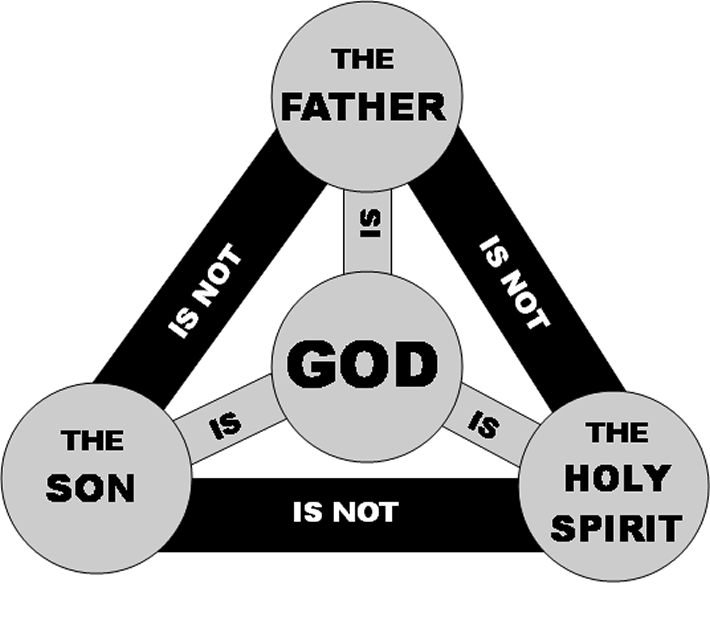The doctrine of the Trinity has been challenged for centuries by those outside the church and, at times, by those within the circle of professing Christianity. Even after the Council of Nicea (A.D. 325) defined the true church’s stance on this doctrine (and declared its chief opponent, Arius a heretic), the Trinity has still come under attack. Interesting enough, practically every false teaching on the Trinity since that time has been based on the same errors of Arius from the fourth century. While it may be worded differently or have a different label on it, objections today are nothing more than the same lie with a slightly different spin.
In love I must warn those who deny the Bible’s teachings on the Person of God to compare their beliefs to those of men like Arius who, again, was deemed a heretic by leaders of the early church. (In fact, I would encourage everyone to go back and read the Nicene Creed that the church adopted. Read it here).
Some reject the thought that there is but one God who exists in three Persons because they don’t understand it. Some reject it because whatever organization they belong to has told them to reject it. Even some groups who call themselves a “church” have rejected the reality of a triune God. But whether anyone accepts or rejects the Bible’s teachings on the Trinity, the truth remains that the Father is God, the Son is God, and the Holy Spirit is God—but there is only one God. All three Persons of the Godhead exist simultaneously and in perfect harmony, yet they are distinct from each other. While the word “Trinity” is not found in the Bible, it is a term that is used to describe the triune God—three coexistent, co-eternal Persons who are God. So while the word “Trinity” does not exist in Scripture the concept represented by the word “Trinity” does.
R. C. Sproul defines it well in his book titled What is the Trinity? (Reformation Trust Publishing, 2011, pg. 50-51):
“… while God is one in essence, there are three subsistences, three persons, that stand under the essence. They are part of the essence. All three have the essence of deity. Nevertheless, we can make a distinction between the three persons of the Trinity, because each member of the Godhead has unique attributes. We say the Father is God, the Son is God, and the Holy Spirit is God, but we don’t say that the Father is the Son, the Son is the Holy Spirit, or the Holy Spirit is the Father. There are distinctions between them, but the distinctions are not essential, not of the essence. They are real, but they do not disturb the essence of deity.”
(I also recommend the chapter on the Trinity entitled Trinty – God is One and Three in J. I. Packer’s Concise Theology. Read it here).
As I hear of more and more people who reject what the orthodox view of the Trinity teaches, I believe the problem lies not so much with the doctrine itself, but with the authority of Scripture. Groups and organizations who deny the Trinity are in reality denying the Bible. I say this because the Bible is clear in revealing to us that God exists in three Persons. In addition to many other places in Scripture one needs only to turn to Jesus’ baptism in the synoptic Gospels to see all three Persons of the Godhead present together at the same time. False teachings, such as modalism, cannot rightly interpret these texts without denying the true authority and inerrancy of the Bible. And that is true for all of the texts that teach that our God is triune in nature.
The Trinity, like many other doctrines of the Bible, is not easy for us as humans to understand. It’s not easy to understand because God is far greater than we are. If we could fully understand God then we ourselves would be omniscient instead of Him. Some have said of the Trinity, “Try and understand it completely and you’ll lose your mind; try and deny it and you will lose your soul.” But as with all doctrines of Scripture absolute truth is not contingent upon our human capacity or ability to understand it. Truth is whether we understand, believe, or accept it or not. By the power of the Holy Spirit we must study and pray to understand all we can about God. But we must also humble ourselves and accept the fact that His ways are not our ways and we will never fully grasp the reality of all that God is.
The world today is filled with religions and teachings that sound convincing on the surface but in reality are false and destructive. As a result Christians need more than ever to stand firm in our understanding and proclamation of the truth. We can only do this by knowing Christ more and diligently seeking Him as He has revealed Himself to us in His written Word. Seeking Him, loving Him, cherishing Him, and learning more about who He is are all ways that we can “grow in the grace and knowledge of our Lord and Savior Jesus Christ.”
By His Grace,
Pastor Johnny

